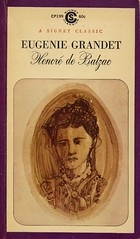The 1964 translation by the poet and radio dramatist, Henry Reed takes the text of the last version to be revised by the author (the so-called 'Furne corrigé') but follows the Garnier edition of 1961 in restoring 'Balzac's shapely design of the edition of 1834'. It also includes the opening and closing paragraphs, to which only readers of the anonymous 1859 translation had previously had access in English. Further emendations are discussed by Reed in a lengthy translator's note. They include, controversially, the correction of what the translator identifies as the printer's wrongly positioned insertions of Balzac's marginalia (though without apparently checking his intuitions against the manuscript or that portion of the corrected proof that survives). Reed also tidies up, as far as possible, Balzac's own, incomplete, alterations of dates and the ages of certain of his characters. 'Grandet no longer puts on a couple of decades in the space of 12 to 14 years and ... Madame Grandet does not die both in 1820 and 1822'. A similar attempt is made to substitute 'a more logical time-scheme' for Balzac's 'grotesque miscalculations connected with the central action'.
Reed's actual translation is outstanding and is to be preferred to its rivals. It modernized the original in precisely the way Milton Crane claimed for Bair's version and avoids the errors and distortions that disqualify Crawford's. Consistently resourceful, it is inherently Balzacian through the translator's own relish for words. Alone of all the published English translations, it brings the characters alive through their speech, as in this case of an outburst by the Grandet's servant, offered a small glass of cassis from the bottle she was carrying when she tripped on a rickety stair: 'In my place, there's plenty what would have broken the bottle. I held it up in the air and nearly broke my elbow instead'.
Reed's actual translation is outstanding and is to be preferred to its rivals. It modernized the original in precisely the way Milton Crane claimed for Bair's version and avoids the errors and distortions that disqualify Crawford's. Consistently resourceful, it is inherently Balzacian through the translator's own relish for words. Alone of all the published English translations, it brings the characters alive through their speech, as in this case of an outburst by the Grandet's servant, offered a small glass of cassis from the bottle she was carrying when she tripped on a rickety stair: 'In my place, there's plenty what would have broken the bottle. I held it up in the air and nearly broke my elbow instead'.
[p. 103]
I'm ashamed to admit, while I've read Reed's translation of Père Goriot, I haven't actually read his Eugénie Grandet, because my used bookstore copy is in such good condition, I don't want to ruin it!








